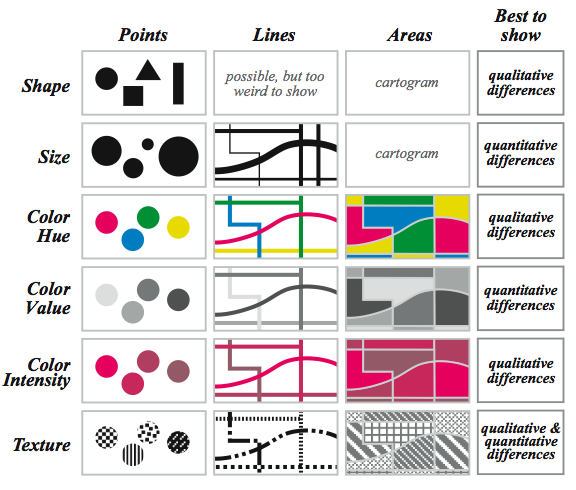All mentoring is not created equal, we discovered. There is a special kind of relationship—called sponsorship—in which the mentor goes beyond giving feedback and advice and uses his or her influence with senior executives to advocate for the mentee. Our interviews and surveys alike suggest that high-potential women are overmentored and undersponsored relative to their male peers—and that they are not advancing in their organizations. Furthermore, without sponsorship, women not only are less likely than men to be appointed to top roles but may also be more reluctant to go for them.The article is a bit anecdotal in parts, but has some underlying interesting ideas in it that are grounded in research. I'm not sure how applicable it is to academic careers, but having a mentor who in addition to giving you advice can help sell you and your ideas to others (institutional peers, editors, etc) is almost always, in my experience, a helpful thing.
Wednesday, August 25, 2010
Why men still get more promotions than women
Very interesting article in The Harvard Business Review on male vs. female mentoring, and the difference it can make in business contexts.
Monday, August 23, 2010
If horses were wishes
 |
| Photo by Stuck in Customs |
I guess it's different in the biosciences or physics where a whole team of people are working late in the lab on an experiment. But in my field you pretty much fly solo. Even when I collaborate with other researchers, somehow it's still just me writing the bulk of the software, collecting the data, analyzing the results, and writing the paper. (And, apparently, complaining on my blog :))
How collaborative is your work?
Wednesday, August 18, 2010
Regarding Quotas
In my post on nurture vs. nature, thehackerfairy asked about my thoughts on some comments left after a recent Guardian article on this topic. The article helps support my claim that really it's a social problem we're facing in CS, not some difference due to biology. And the article cites my favorite developmental neuroscientist, Lise Eliot, as support.
I couldn't find the particular comment HF was alluding to, but I think the basic idea was, "Well, if men and women are biologically equal, let's get rid of quotas / affirmative action / encouragement initiatives / etc." I've seen this argument pop up in other communities of underrepresented people as well.
Here's my opinion: I am more than happy to see all of these inclusion initiatives be eliminated... once the groups of people they're targeting stop being systematically discriminated against. And for anyone who doesn't think women, people of color, people with disabilities, and LGBT people are being systematically discriminated against in STEM, I say: please come out from under that rock.
I couldn't find the particular comment HF was alluding to, but I think the basic idea was, "Well, if men and women are biologically equal, let's get rid of quotas / affirmative action / encouragement initiatives / etc." I've seen this argument pop up in other communities of underrepresented people as well.
Here's my opinion: I am more than happy to see all of these inclusion initiatives be eliminated... once the groups of people they're targeting stop being systematically discriminated against. And for anyone who doesn't think women, people of color, people with disabilities, and LGBT people are being systematically discriminated against in STEM, I say: please come out from under that rock.
Thursday, August 12, 2010
Open peer review done right
There's been a lot of talk recently on the idea of open peer review, open source science, and so on. arXiv was sort of intended to serve this role, but at least in my subfield it's uncommon to put papers on there before they've been accepted by a "proper" conference/journal. In general we use it for open archival purposes, but not for initial peer review.
However, I recently saw a really nice use of open peer review. Vinay Deolalikar of HP Labs sent a manuscript to a few of his colleagues which was a proof of P ≠ NP. This is one of the most fundamental unsolved problems in CS, in fact it's such an important problem that The Clay Mathematics Institute offers a $1 million prize to anyone who can solve it. I won't burden you with the details of the problem or proof because that's not what this post is about, and will instead refer you to this excellent summary in New Scientist if you are interested.
So Deolalikar sent this proof to his colleagues, and Greg Baker (with permission) posted the manuscript on his blog. Somehow the blog post got Slashdotted and next thing you know everyone was talking about it. What I find really remarkable was how in many places there was a nice, civil discussion among the theory types about the strengths and weaknesses of the proof. (You can read about this in Richard Lipton's blog starting here).
What I especially loved was the peanut gallery. People were just thrilled to be watching the action. Even people with no background on the topic were offering support and encouragement. Here are some comments from Lipton's blog:
 |
| Image by Network Osaka |
So Deolalikar sent this proof to his colleagues, and Greg Baker (with permission) posted the manuscript on his blog. Somehow the blog post got Slashdotted and next thing you know everyone was talking about it. What I find really remarkable was how in many places there was a nice, civil discussion among the theory types about the strengths and weaknesses of the proof. (You can read about this in Richard Lipton's blog starting here).
What I especially loved was the peanut gallery. People were just thrilled to be watching the action. Even people with no background on the topic were offering support and encouragement. Here are some comments from Lipton's blog:
And these two really made me say, "awwww" (boldface is mine):Go Vinay!I agree with the spirit of this posting. I am not an expert in complexity theory so I am unable to provide any feedback (not even elementary). However, I like it that there are researchers like Vinay who are not afraid of tackling the hardest problems. I am anxious to know what are the consequences of Vinay’s work.
Professor Lipton,Your accessible and well-written writings motivate me to continue studying mathematics. I develop software for a living; to stay sharp, I try to study ‘real’ proofs in my spare time. Complexity is an amazing field… I cannot wait to see what we’ll learn about computation (and its relation to physics, and to everything else).Thanks for the inspiration!
I applaud Lipton for cultivating a positive exchange of ideas and place for civil discussion and making the review public for all to watch. Even though things got heated at times, in general the discourse was constructive and positive. Top complexity theoreticians came together to help Deolalikar out, for no reason other than they think it's a cool problem and they're nice people, and I think that's just fantastic.“P.S. I hope these discussions are helpful to the community at large.”
This member of the community at large can’t understand a word you say, but is nevertheless fascinated by every new post and comment. Seeing the review process unfold in public has rekindled my long-dormant interest in mathematics. I intend to register for a class this fall and (who knows?) perhaps pursue that Ph.D. after all these years.
Don’t infer from the paucity of experts who can contribute to the public conversation that you might as well confer entirely in private; on the contrary, public discussion is an immense service to the community. Thank you.
Monday, August 9, 2010
Not your grandma's Tufte
I really appreciate good data visualization because I think it's one of the best ways to communicate ideas. It's hard to know how to do it well, though, if you're not trained in design. For some reason I always stress over little details - fonts, colors, margins. But that happens when I cook, too, so maybe that's more a reflection of my personality than anything else.
I once met Ben Fry, who if you don't know is the co-creator of the Processing programming language, and (also) made a name for himself doing some gorgeous visualizations for SEED magazine. I had just seen a fantastic design of his, and asked him how he went about choosing its colors and fonts. He gave me some advice I still follow today: start with black helvetica and go from there.
As well as this advice has served me, I feel ready to move into serif fonts and at least dual-colored bar charts. So lately I've enjoyed reading the blog posts from Shawn Allen's Data Visualization Course. He starts with a history of data visualization (remember Florence Nightingale?) and builds up from there. It's excellent and I highly recommend checking it out.
 |
| Image from Understanding Graphics |
I once met Ben Fry, who if you don't know is the co-creator of the Processing programming language, and (also) made a name for himself doing some gorgeous visualizations for SEED magazine. I had just seen a fantastic design of his, and asked him how he went about choosing its colors and fonts. He gave me some advice I still follow today: start with black helvetica and go from there.
As well as this advice has served me, I feel ready to move into serif fonts and at least dual-colored bar charts. So lately I've enjoyed reading the blog posts from Shawn Allen's Data Visualization Course. He starts with a history of data visualization (remember Florence Nightingale?) and builds up from there. It's excellent and I highly recommend checking it out.
Thursday, August 5, 2010
Signal Boost: GHC and ADVANCE Resume Databases
 |
| Image by Nanaki |
- Grace Hopper Resume Database
- Rice University NSF ADVANCE Program's National Database of Underrepresented PhD Students and Postdocs
The GHC one is more for CS/EE/IT type folks, but the Rice one is much broader - in addition to engineering, it also includes the natural sciences and psychology.
Can't hurt, could help. In this job market I think there's no harm in trying.
Wednesday, August 4, 2010
IEEE vs. ACM Jobs Death Match
In order to keep my ear to the ground on what's happening outside the ebony tower, I subscribe to several career newsletters from both ACM and IEEE. In case you're unfamiliar, these are the two primary professional organizations for both academic and industrial computer scientists and engineers.
 |
| Photo by Kevin Steele |
Today I received two "career alert" emails from each. Here are the headlines from the ACM one:
- "After Pay Cuts, IT Workers May Seek Payback in New Job"
- "Tips to Recharge Your Job Search"
- "Five Mistakes Online Job Hunters Make"
- "Five Questions to Ask Before Taking That Telecommuting Job"
- "How to Decode a Job Posting"
- "Why Personal Branding is So Misunderstood"
- "Befriend the Intern to Fire Up Your Career"
- "Much More Than Office Space"
- "Are Female IT Graduates Still Underrepresented?"
- "U.S. Congressman Introduces Measure to Address Crisis in K-12 Computer Science Education"
Ok, so 10% "You're hosed", 70% "You're hosed, here's help", and 20% non-sequitur. Now let's look at IEEE:
- "Employers Getting More Picky Hiring Engineers"
- "Learning to Think Small"
- "The Big Deal About Details"
- "Cure for Joblessness: Go East?"
#2 is basically a "You're hosed, here's help" article. #3 is a "The job market sucks so much right now that if you say "Um" or have sweaty palms YOU'RE OUT." #4 is "Honestly, things are so bad you may as well pack your bags and move to India."
#1 is the most depressing of all. The article implies recruiters are simply keyword matching for niches instead of hiring people who can actually reason and think. This is terribly stupid. In an economy like this, you want people who are versatile, not people who have X years of experience on some particular chip set or programming language that probably won't even be used anymore come next year.
Technology changes very quickly. Companies who are clever will hire people who are good at learning and adapting, not people who have mastered one particular niche trade. If you understand the fundamentals of how a computer works, it doesn't matter what shape or size it is, or what brand is stamped on it. It doesn't matter if it's Gopher or bittorrent. If you know how to solve problems and learn new things, you can figure it out.
Anyway, I feel like it's more useful to read the ACM alerts only because they seem to actually list constructive things you can do if you're unemployed. Instead of just moving to India.
Sunday, August 1, 2010
Women in CS: It's not nature, it's culture
Here's my goal for the year:
To convince people to stop throwing up their hands and saying women are just not interested in Computer Science, and instead do something about it.
Whenever someone says this, the implication is, "It's not our fault. We're not doing anything wrong." Instead of saying, "How can we retain/attract women?" they simply assume that we are:
We see similar trends in other parts of Asia. I don't have recent data, but around 2003 women were earning 59% of science and engineering degrees in China, 46% in South Korea, and 66% in Japan. (Compared with 33% in the US). [2]
As for the biology argument, if you're still not convinced, read Terri Oda's excellent piece, "How does biology explain the low numbers of women in computer science? Hint: it doesn't."
So for the non-Asian world that is still struggling with underrepresentation [2], I think we need to change our culture. We need to eliminate the geek mythology (that to be successful you must eat/sleep/breathe code and nothing else) [3], we need to ensure we illustrate the purpose and value of computing [4], we need to be proactive in recruiting women [5], we need to provide plenty of other women as peers and role models [6], and we probably should de-masculinize the workplace [7]. These approaches are all shown to make a big difference in attracting and retaining women in CS.
If you do these things at your institution, I guarantee you that in addition to helping attract women, you will also attract men. And probably also people of different races, cultures, ethnicities, and socio-economic statuses. Which given the recent yo-yo enrollment trends over the last decade is not a bad thing at all. We really don't want computer science departments going the way of the way of the dinosaur2.
So, please - stop mansplaining and start doing.
Notes
1 It's worth mentioning since it's a common misunderstanding: coding != computer science, coding ∈ computer science. It's like how doing an assay is not molecular biology research. Assays are an aspect of the field of molecular biology, coding is an aspect of the field of computer science.
2 No disrespect to anyone who works in Paleontology (I am truly saddened to hear of your suffering), but I just couldn't resist the pun.
[5] Cohoon, J. M. 2002. Recruiting and retaining women in undergraduate computing majors. SIGCSE Bull. 34, 2 (Jun. 2002), 48-52.
[6] Lagesen, V. The Strength of Numbers: Strategies to Include Women into Computer Science. Social Studies of Science February 2007 vol. 37 no. 1 67-92.
[7] Cheryan, S., Plaut, V.C., Davies, P.G., Steele, C.M. "Ambient belonging: How stereotypical cues impact gender participation in computer science." Journal of Personality and Social Psychology, Vol. 97, No. 6. (December 2009), pp. 1045-1060.
To convince people to stop throwing up their hands and saying women are just not interested in Computer Science, and instead do something about it.
Whenever someone says this, the implication is, "It's not our fault. We're not doing anything wrong." Instead of saying, "How can we retain/attract women?" they simply assume that we are:
- Not interested
- Biologically deficient at math/logical thinking
- Don't have what it takes to be a "code cowboy"1
These assumptions are not correct. In some parts of the world we see equal numbers of women and men studying computer science and engineering and being employed in the tech sector. For example, in Malaysia women comprise 50-60% of jobs in the tech sector. This is entirely due to culture - turns out, men who work indoors are seen as less masculine than those that work outdoors, and women who work outdoors are seen as lower class [1]. It's funny, we actually have sexism working in reverse - leading to an increase in women working in technology.
 |
| The data ain't pretty, though 1982 sure looked nice. Source: NYTimes |
As for the biology argument, if you're still not convinced, read Terri Oda's excellent piece, "How does biology explain the low numbers of women in computer science? Hint: it doesn't."
So for the non-Asian world that is still struggling with underrepresentation [2], I think we need to change our culture. We need to eliminate the geek mythology (that to be successful you must eat/sleep/breathe code and nothing else) [3], we need to ensure we illustrate the purpose and value of computing [4], we need to be proactive in recruiting women [5], we need to provide plenty of other women as peers and role models [6], and we probably should de-masculinize the workplace [7]. These approaches are all shown to make a big difference in attracting and retaining women in CS.
If you do these things at your institution, I guarantee you that in addition to helping attract women, you will also attract men. And probably also people of different races, cultures, ethnicities, and socio-economic statuses. Which given the recent yo-yo enrollment trends over the last decade is not a bad thing at all. We really don't want computer science departments going the way of the way of the dinosaur2.
So, please - stop mansplaining and start doing.
Notes
1 It's worth mentioning since it's a common misunderstanding: coding != computer science, coding ∈ computer science. It's like how doing an assay is not molecular biology research. Assays are an aspect of the field of molecular biology, coding is an aspect of the field of computer science.
2 No disrespect to anyone who works in Paleontology (I am truly saddened to hear of your suffering), but I just couldn't resist the pun.
References
[1] Mellstrom, U. Masculinity, Power and Technology: A Malaysian Ethnography. Ashgate, 2003.
[2] Simard, C. "The State of Women and Technology Fields Around The World". Anita Borg Institute. 2007.
[3] Margolis, J. and Fisher, A. "Geek Mythology and Attracting Undergraduate Women to Computer Science" Impacting Change Through Collaboration, proceedings of the Joint National Conference of the Women in Engineering Program Advocates Network and the National Association of Minority Engineering Program Administrators, March, 1997.
[4] Margolis, J., Fisher, A., and Miller, F. "Caring About Connections: Gender and Computing". IEEE Technology and Society, December, 1999.[2] Simard, C. "The State of Women and Technology Fields Around The World". Anita Borg Institute. 2007.
[3] Margolis, J. and Fisher, A. "Geek Mythology and Attracting Undergraduate Women to Computer Science" Impacting Change Through Collaboration, proceedings of the Joint National Conference of the Women in Engineering Program Advocates Network and the National Association of Minority Engineering Program Administrators, March, 1997.
[5] Cohoon, J. M. 2002. Recruiting and retaining women in undergraduate computing majors. SIGCSE Bull. 34, 2 (Jun. 2002), 48-52.
[6] Lagesen, V. The Strength of Numbers: Strategies to Include Women into Computer Science. Social Studies of Science February 2007 vol. 37 no. 1 67-92.
[7] Cheryan, S., Plaut, V.C., Davies, P.G., Steele, C.M. "Ambient belonging: How stereotypical cues impact gender participation in computer science." Journal of Personality and Social Psychology, Vol. 97, No. 6. (December 2009), pp. 1045-1060.
Subscribe to:
Posts (Atom)
